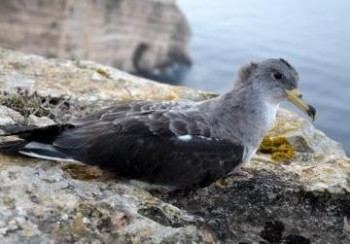Paolo Becciu (Ornis Italica, Rome, Italy,) and colleagues have produced a poster that reports on a study of the effects of an all-night disco on nest attendance in Scopoli’s Shearwater Calonectris diomedea.
The poster’s abstract follows:
In the summer 2014, four outdoor disco events were organised during the chick rearing period in close proximity of the Scopoli’s shearwater colony of Linosa island, the largest colony of this species in Italy (Massa & Lo Valvo 1986). We took this opportunity to investigate the effects of high intensity artificial light and sound on the behaviour of parent birds and the effects on chick growth and survival. Since propagation of light and sound over the colony was differentially affected by the topography of the area, we were able to separate the specific effects on nest attendance of these two disturbance factors. Shearwaters return to the colony when it is completely dark, often avoiding moonlight. This behaviour probably evolved to minimize predation risk by gulls and other diurnal predators. The deleterious effects of artificial light sources on shearwaters are mostly related to mortality caused by attraction of fledglings to the light (Rodrìguez & Rodrìguez 2009). In fact there are no studies on potential effects of artificial light and sound disturbance on parental nest provisioning and their consequences on chick growth. Some touristic recreational activities have been shown to cause elevated stress responses, increased heart rate, and nest desertion in other seabird species.”

Fledgling Scopoli's Shearwater
Reference:
Becciu, P., Benedetti, M.C., Massa, B. & Dell'omo, G. 2015. Conflicts between touristic recreational activities and breeding shearwaters: light but not sound disturbance affects nest attendance. XXVI Conference of Italian Society of Ethology, Parma, Italy.
John Cooper, ACAP Information Officer, 21 December 2015

 English
English  Français
Français  Español
Español